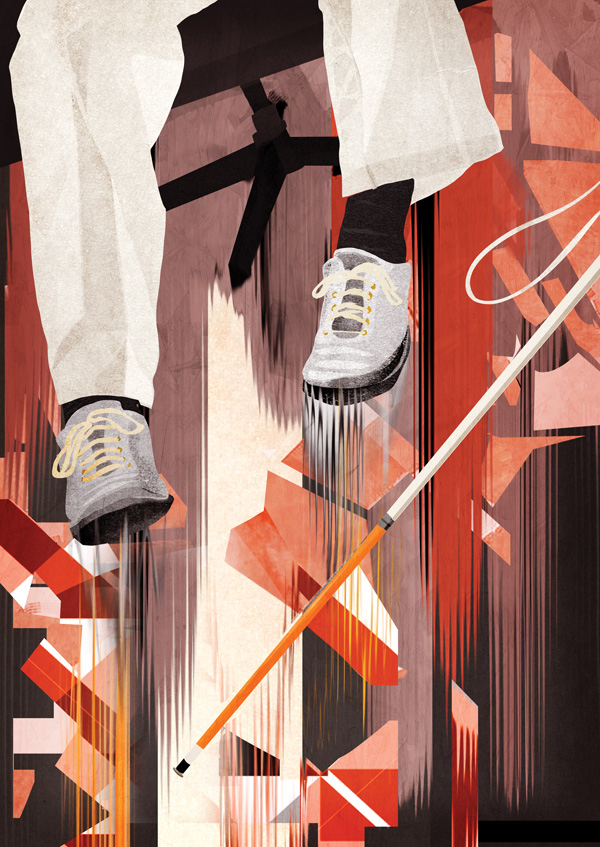
EXHILARATION
Catherine Wong’s flash fiction piece tells of a blind man’s struggle to deal with the newfound miracle of sight. Illustrated by Bee Johnson.
‘Look look’, the first words after the gauze came off. I read about this man in a book, blind for forty years. In the dehumanizing clinical style of a case study, the book reduces him to two letters – V.I – and in the interest of privacy, strips him of even a name. Four decades of blindness, and then the brain scan, the miracle, one surgery to flip on a switch in the mind and lo, there was light. He reported new sight like a baby’s, unfocused and unclear. A beige blur hovers by his hospital bedside, a gash opens in it and there is speech. He realizes that this is a face, the face of his wife. I imagine opening eyes numbed by forty years of darkness into this world awash in colors, everything painted, sounds matched with newfound pictures. There are no laws of perspective, not yet. Every turn of the head brings another universe, all the colors shifting and swirling. The world was one of brightly-coloured patterns to be filed away in the mind, by a lifetime of tastes and smells and once imageless sounds. If this were me, I would ask for children’s books, candy-colored prints on the cardboard. I would beg for flashcards, photos, movies, paintings, and picture windows, even while the world was a mess of blurs, paint spilled all over my vision in great sweeping swaths of color. Never mind why the sky is blue, just let it be blue.
In this story, there is a window. From his hospital bed this man – the real one – counts cars, coloured confetti in his vision, taxis and school buses loud against the backdrop of black city streets. Little things make his breath catch in his throat; a flame dancing in its holder, the infinite illusion of a room in a mirror, the glint of a light on a glass of water, to be looked at once and twice and again. I imagine a room papered with eclectic patterns, stripes next to polka dots, a kaleidoscopic beauty to compensate for forty color-starved years. ‘Look look’.
Maybe the gauze came off too quickly. Maybe the world was like fire on his eyes, every waking moment a dream, joy melting into pain. Within one day, he was tired. Within one month, he wandered the halls of his home with his eyes closed, making soft sad moans. The sheer exhaustion of sight, this marvelous dream he had wished for since childhood, overwhelmed him. He had not imagined that vision had rules, that he might have to learn how to see. A cat was a thousand cats; without a mind trained to blend, to recognize that an object seen from every angle is still a single whole, his own pet was unrecognizable, a different image each time when seen from the front, or behind, or the side. Without an understanding of depth, the world became an obstacle course. He reached out a hand to touch houses that were, in reality, miles away. He stumbled into poles on the sidewalk. He had never been this disoriented, not even when he was blind, and groped his way through the world with his hands.
A few years later, something burst in his brain, the switch flipped back, no surgery to correct it again. Back in his hospital room, family members came sadly to his bedside. The nurses pulled a shade down over the window in mourning, veiling the city streets and the cars that he had counted. He was pronounced a tragedy, all his colours gone, and yet peace was restored, the permanent shroud thrown over his eyes, calming. He stumbled back into the world with a brilliant orange and white cane, deliriously happy to be returned to the familiar black cocoon of his blindness.
To ensure that you never miss a future issue of the print magazine, subscribe from just £24 for 4 issues.
